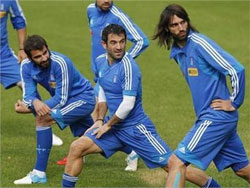
Paris, June 21: Euro 2012 has been nothing if not entertaining, with plenty of goals, thrills and spills and assorted controversies from racism to goals not being given that should have been -- with Greece adding the surprise factor.
With the quarter-final line-up now known, the football fan might feel entitled to ask a nagging question: "Will the best team win?"
If this season in general has been anything to go by the answer is likely to be: "Probably not."
International football can be a crabbier affair than its domestic equivalent -- witness the difference in pace between the frenetic English Premier League, even with its foreign stars, and an England team which can verge on the pedestrian.
Yet a parallel is emerging between the international games as witnessed by the European championships and the Champions League, widely seen as the pinnacle of what the game has to offer at any level.
For many observers, Barcelona rank in terms of pure talent as the outstanding club team in Europe, with Bayern Munich not too far behind. But it was Chelsea who denied both to land last season's Champions League against all the odds.
Barca may have had 80 percent possession and 42 attempts on goal to 11 for their rivals over two games, yet it was the Londoners who advanced to the final.
There, Bayern cruised home in statistical terms -- but lost on penalties.
At Euro 2012, there are several indications the "best" team doesn't always win.
England topped Group D after beating Ukraine, yet the hosts enjoyed 62.5 percent of second-half possession, as well as a "goal" that wasn't given, despite crossing the line.
France, on the other hand, boasted a 23-game unbeaten run before losing to a Sweden side who showed flashes of brilliance with a lethal Zlatan Ibrahimovic.
But it was England who cruised into the final eight to face Italy instead of Spain.
Britain's Daily Telegraph newspaper was confused on Wednesday, asking: "England top of the pile, Spain dodged and Rooney scoring the winner. Who makes this stuff up?"
Group A was another case in point.
On the evidence of the first matches, Russia looked streets ahead of their rivals after swatting the Czech Republic 4-1, only to crash out to a Greek side who, as in their 2004 glory year, most pundits had discounted after they lost to... the Czechs.
The Netherlands came in as one of the sides with the most impressive qualifying records and the pedigree of former champions.
It came as a surprise, then, that the 1988 winners lost all three of their matches, lumping their non-achievement this time round with that of the Republic of Ireland.
Football is not an exact science but quantitative analysis should act as some kind of guide.
After all, have Germany and Brazil, as the "best" teams in history, not tended to re-establish the natural order of things by winning more often than anybody else?
British scientist John Maddox chose a landmark year to carry out a study for Nature magazine.
In 1966, the year England beat West Germany to win their only World Cup, Maddox wrote an article "We wuz robbed" (We were robbed) and established the chances of a draw at just 0.27 -- or statistically 27 in 100 matches.
He then mused on what that meant for the remaining matches.
"In other words, if two teams are equally matched, the chance that the result will be an active injustice to one of them will be 0.73."
One might object that the term "equally matched" is subjective and only relative -- but few fans would stop to reason as much if their team has just lost a close game.
Maddox went further in establishing that "a team which is slightly less skilled than its opponent can nevertheless expect a one in three chance of winning the deciding match" -- what one might today perhaps call the Chelsea factor.
He suggested redesigning certain parameters of the game to flatten the effect of such a perceived "injustice", including a series of matches for finals, as happens in the Major League Baseball World Series.
Failing that, Maddox suggested altering the game itself, "possibly by widening the goalposts or by abolishing goalkeepers".
And UEFA think goal-line technology is controversial.




Comments
Add new comment